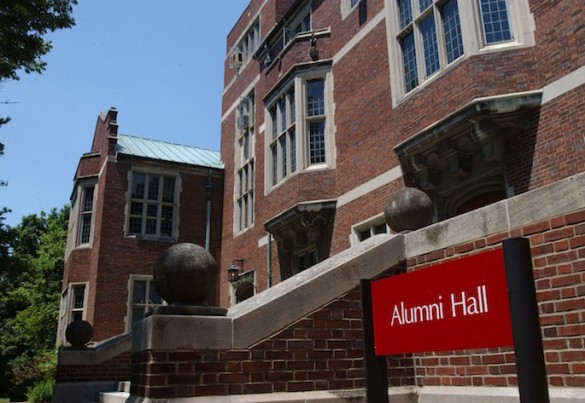
Massive open online courses and other digital learning platforms will be the focus of a new institute being launched this fall at Vanderbilt University.
The new Institute for Digital Learning will be led by Douglas Fisher, associate professor of computer science and of computer engineering at the School of Engineering. It will be housed in the newly renovated Alumni Hall.
The institute’s creation was one of the recommendations made by the Chancellor’s Committee on Social Media and the Internet, assembled by Chancellor Nicholas S. Zeppos in February 2012.
“[rquote]As a research institution of incredible distinction and breadth, Vanderbilt is uniquely positioned to have an impact in digital learning,” Zeppos said.[/rquote] “With this new institute and Doug’s leadership, we will explore how to best leverage and shape these tools to increase our own students’ engagement and exposure into research and discovery, and also to bring the knowledge generated by our faculty to traditional and non-traditional students around the globe.”
The new institute will focus on developing the university’s strategy related to digital learning for courses offered on campus and those offered through MOOCs and other platforms. It will manage the university’s partnership with Coursera and oversee the production of content for Coursera and for other platforms. In addition, the institute will study the medium itself to promote innovations in teaching on campus afforded by digital resources. It will also encourage and support faculty and student research on MOOCs.
Fisher will report to Associate Provost for Undergraduate Education Cynthia Cyrus, who has led the university’s partnership with Coursera and its exploration of similar partnerships with other platforms.
“As we follow through on recommendations made by the Chancellor’s Committee on Social Media and the Internet, I am excited that Doug Fisher will provide leadership for our newly established Institute for Digital Learning,” Provost and Vice Chancellor for Academic Affairs Richard McCarty said. “Doug has already established a national reputation as an innovator in this rapidly emerging area and he will bring a high level of energy to this new position.”

Fisher is a frequent speaker and writer on the topic of digital learning and is seen as a thought leader on the concept of “flipped classrooms,” in which students learn core material outside of the classroom through video and other digital tools and spend classroom time on collaboration and discussion with one another and with the instructor.
“I’m thrilled and honored to be leading the institute, and I’m thankful to be an educator in what is very probably a time of great transformation,” Fisher said. “The institute represents a commitment by Vanderbilt to understand the changes that are coming, to anticipate them as best we can, and to design for change – most notably for the benefit of our students, as well as opening new areas of research, in education, in ‘big data’ and other areas that we still aren’t sure about.”
Fisher’s research focuses on artificial intelligence, particularly machine learning, computational models of creativity and applications in environmental sustainability. Fisher joined the Vanderbilt faculty in 1987 after earning his Ph.D. from the University of California, Irvine. Fisher also served as a program director at the National Science Foundation from 2007 to 2010, receiving the Director’s Award of Excellence for Program Management in 2010.